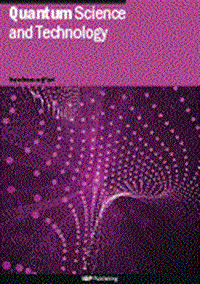通过黎曼优化寻找量子代码
IF 5
2区 物理与天体物理
Q1 PHYSICS, MULTIDISCIPLINARY
引用次数: 0
摘要
我们提出了一种新的优化方案,旨在为已知量子噪声信道找到最优可校正的子空间码。对于每个候选子空间代码,我们首先关联一个通用恢复映射,就好像代码是完全可纠正的一样,并旨在最大限度地提高性能功能,该功能将修改的信道保真度与可调的正则化项相结合,从而促进更简单的代码。通过这种选择,优化只在代码集上执行,而不是在恢复操作符集上执行。将固定维数的编码集参数化为复值Stiefel流形,然后用基于梯度的局部算法求解得到的非凸优化问题。当无法找到完全可纠正的代码时,在恢复克劳斯图上运行第二个优化程序,也通过stinspring表示在合适的Stiefel流形中进行参数化。为了测试该方法,在不同的场景中寻找可校正的代码,并与现有的代码进行比较:三个量子比特遭受比特翻转错误(单个和相关),四个量子比特经历局部幅度阻尼,五个量子比特遭受局部去极化通道。在前面的例子中,我们发现并测试了近似代码,以及由自旋浴引起的作用于自旋的纯非马尔可夫减相噪声,以及IBM的ibm_kyoto量子计算机的前三个量子位的噪声。保真度结果与现有的迭代优化算法竞争,相对于我们保持强大的计算优势,同时获得更简单的代码。本文章由计算机程序翻译,如有差异,请以英文原文为准。
Finding quantum codes via Riemannian optimization
We propose a novel optimization scheme designed to find optimally correctable subspace codes for a known quantum noise channel. To each candidate subspace code we first associate a universal recovery map, as if the code was perfectly correctable, and aim to maximize a performance functional that combines a modified channel fidelity with a tuneable regularization term that promotes simpler codes. With this choice optimization is performed only over the set of codes, and not over the set of recovery operators. The set of codes of fixed dimension is parametrized as a complex-valued Stiefel manifold: the resulting non-convex optimization problem is then solved by gradient-based local algorithms. When perfectly correctable codes cannot be found, a second optimization routine is run on the recovery Kraus map, also parametrized in a suitable Stiefel manifold via Stinespring representation. To test the approach, correctable codes are sought in different scenarios and compared to existing ones: three qubits subjected to bit-flip errors (single and correlated), four qubits undergoing local amplitude damping and five qubits subjected to local depolarizing channels. Approximate codes are found and tested for the previous examples as well pure non-Markovian dephasing noise acting on a spin, induced by a spin bath, and the noise of the first three qubits of IBM’s ibm_kyoto quantum computer. The fidelity results are competitive with existing iterative optimization algorithms, with respect to which we maintain a strong computational advantage, while obtaining simpler codes.
求助全文
通过发布文献求助,成功后即可免费获取论文全文。
去求助
来源期刊

Quantum Science and Technology
Materials Science-Materials Science (miscellaneous)
CiteScore
11.20
自引率
3.00%
发文量
133
期刊介绍:
Driven by advances in technology and experimental capability, the last decade has seen the emergence of quantum technology: a new praxis for controlling the quantum world. It is now possible to engineer complex, multi-component systems that merge the once distinct fields of quantum optics and condensed matter physics.
Quantum Science and Technology is a new multidisciplinary, electronic-only journal, devoted to publishing research of the highest quality and impact covering theoretical and experimental advances in the fundamental science and application of all quantum-enabled technologies.
 求助内容:
求助内容: 应助结果提醒方式:
应助结果提醒方式:


